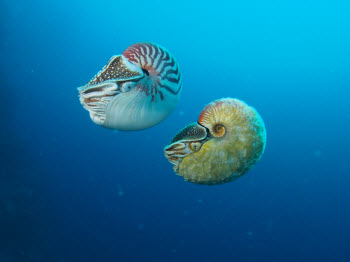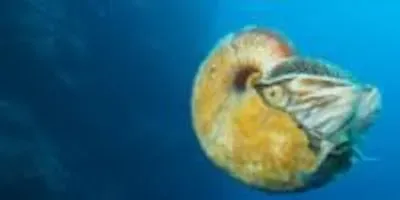 Allonautilus scrobiculatus off the coast of Ndrova Island in Papua New Guinea.Photo credit: Peter WardIn early August, biologist Peter Ward returned from the South Pacific with news that he encountered an old friend, one he hadn’t seen in over three decades. The University of Washington professor had seen what he considers one of the world’s rarest animals, a remote encounter that may become even more infrequent if illegal fishing practices continue.
Allonautilus scrobiculatus off the coast of Ndrova Island in Papua New Guinea.Photo credit: Peter WardIn early August, biologist Peter Ward returned from the South Pacific with news that he encountered an old friend, one he hadn’t seen in over three decades. The University of Washington professor had seen what he considers one of the world’s rarest animals, a remote encounter that may become even more infrequent if illegal fishing practices continue.
The creature in question is Allonautilus scrobiculatus, a species of nautilus that Ward and a colleague had previously discovered off of Ndrova Island in Papua New Guinea. Nautiluses are small, distant cousins of squid and cuttlefish. They are an ancient lineage of animal, often christened a “living fossil” because their distinctive shells appear in the fossil record over an impressive 500 million year period. Ward says this recent sighting of Allonautilus indicates that there is still much to learn about these creatures.
“Before this, two humans had seenAllonautilus scrobiculatus,” said Ward, who holds appointments at the UW in both the Department of Biology and the Department of Earth and Space Sciences. “My colleague Bruce Saunders from Bryn Mawr College found Allonautilus first, and I saw them a few weeks later.”
Those sightings were in 1984, when Ronald Reagan was finishing his first term as president and the oldest millennials were starting preschool. Ward and Saunders collected several Allonautilus scrobiculatusspecimens for analysis and realized that their gills, jaws, shell shape and male reproductive structures differ significantly from other nautilus species.
“Some features of the nautilus — like the shell giving it the ‘living fossil’ label — may not have changed for a long time, but other parts have,” said Ward.
Allonautilus also sports a distinctive accessory clearly visible in photographs.
“It has this thick, hairy, slimy covering on its shell,” said Ward. “When we first saw that, we were astounded.”
This slimy nautilus turned out to be even more elusive than its siblings. Aside from another brief sighting by Saunders in 1986, Allonautilus disappeared until July 2015, when Ward returned to Papua New Guinea to survey nautilus populations. Since nautiluses are expert scavengers, Ward and his colleagues set up “bait on a stick” systems each evening — fish and chicken meat suspended on a pole between 500 and 1,300 feet below the surface — and filmed activity around the bait for 12 hours.
“We started using this approach in 2011,” said Ward. “This year, there were about 30 guys involved and each day we would all watch the movies from the night before at 8X speed. There were a lot of ‘ohs’ and ‘ahs’.”
 Nautilus pompilius (left) swimming next to a rare Allonautilus scrobiculatus (right) off of Ndrova Island in Papua New Guinea.Photo credit: Peter WardOne night’s footage from a site off of Ndrova Island showed an Allonautilus approach the bait after a 31-year absence from Ward’s life. It was soon joined by another nautilus, and the two fought for access to the bait until a sunfish arrived on the scene.
Nautilus pompilius (left) swimming next to a rare Allonautilus scrobiculatus (right) off of Ndrova Island in Papua New Guinea.Photo credit: Peter WardOne night’s footage from a site off of Ndrova Island showed an Allonautilus approach the bait after a 31-year absence from Ward’s life. It was soon joined by another nautilus, and the two fought for access to the bait until a sunfish arrived on the scene.
“For the next two hours, the sunfish just kept whacking them with its tail,” said Ward.
The team also used baited traps to capture several nautiluses, including Allonautilus, at a depth of about 600 feet. Since most nautiluses do not like the heat, the researchers brought them to the surface in chilled water to obtain small tissue, shell and mucous samples and measure the dimensions of each animal. They then transported the animals back to their capture site and released them.
Ward and his colleagues used this information to determine the age and sex of each animal, as well as the diversity of each nautilus population in the South Pacific. Through these studies, they have learned that most nautilus populations are isolated from one another because they can only inhabit a narrow range of ocean depth.
“They swim just above the bottom of wherever they are,” said Ward. “Just like submarines, they have ‘fail depths’ where they’ll die if they go too deep, and surface waters are so warm that they usually can’t go up there. Water about 2,600 feet deep is going to isolate them.”
These restrictions on where nautiluses can go mean that populations near one island or coral reef can differ genetically or ecologically from those at another. The findings also pose a challenge for conservationists.
“Once they’re gone from an area, they’re gone for good,” said Ward.
Illegal fishing and “mining” operations for nautilus shells have already decimated some populations, Ward said. This unchecked practice could threaten a lineage that has been around longer than the dinosaurs were and survived the two largest mass extinctions in Earth’s history. In September, the U.S. Fish and Wildlife Service will decide whether to advocate for nautiluses to become a protected species under the Convention on International Trade in Endangered Species of Wildlife Fauna and Flora, or CITES treaty. Such protection could curb international trade in nautilus shells, with the aim of reducing nautilus harvests across the Pacific.
“As it stands now, nautilus mining could cause nautiluses to go extinct,” said Ward.
Ward hopes to see Allonautilus again, especially since he would like to study how this species, which arose relatively recently according to genetic tests, behaves differently from other nautiluses. Its rarity makes this endeavor challenging.
“It’s only near this tiny island,” said Ward. “This could be the rarest animal in the world. We need to know if Allonautilus is anywhere else, and we won’t know until we go out there and look.”
Ward’s main partners in this field season included Richard Hamilton and Manuai Matawai from the Nature Conservancy and Greg Barord from the City University of New York. More than 30 fisheries experts, guides and local residents in the Admiralty Islands and the Bismarck Archipelago of Papua New Guinea also provided crucial aid and support, Ward said. Their work is funded by National Geographic, the National Science Foundation’s Division of Polar Programs and the Tiffany & Co. Foundation.














